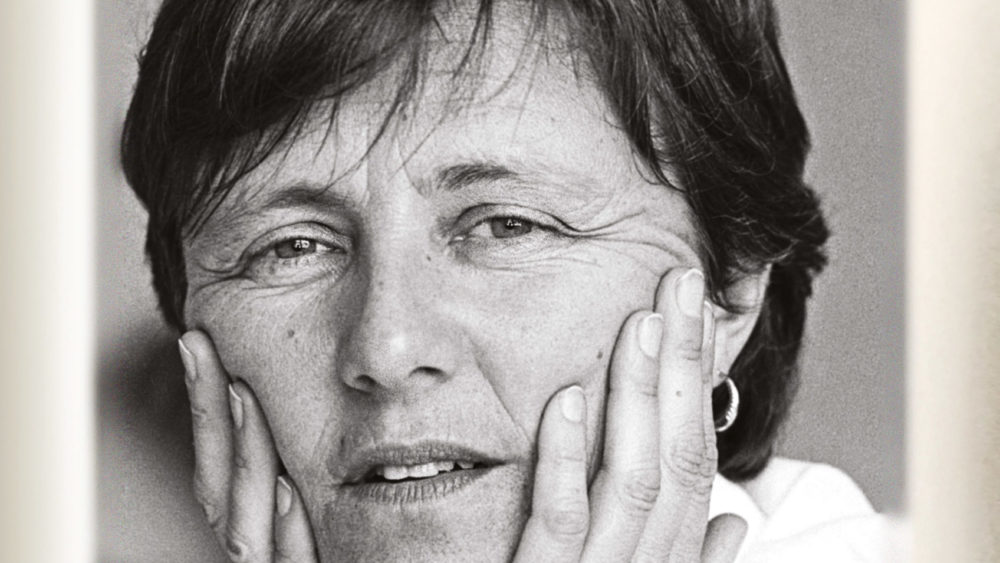Helen Garner’s diaries: Pursued by doubt and desire
A review of the beloved Australian author’s Yellow Notebook
Helen Garner writes with exceptional clarity and poetry about life’s grittier moments. Much of her published fiction and non-fiction draws deeply on personal experience and possesses a strikingly candid narrative voice. This is why the first volume of her diaries doesn’t shock the Garner fan; rather, it provides concentrated insights into her deepest concerns as a woman and as a writer.
Yellow Notebook: Diaries Volume 1, 1978-1987 comprises excerpts from diaries Garner kept from age 36 to age 45, during which time she married for the second time, divorced her second husband, saw her daughter graduate from high school and published the acclaimed novella, The Children’s Bach.
Photographs of Garner, including the one on the cover of Yellow Notebook, are often unsmiling, her posture guarded. It’s an image that doesn’t always fit with the generosity and humour in her writing: the self-portrait in these diaries is of a woman in tune with her need for love and purpose, prone to outbursts of raucous laughter, and susceptible to the giddy feelings normal women experience when complimented by a crush or awarded for their work.
Reading her diaries, it’s hard not to notice Garner’s sense of her inadequacy as a writer, especially when she expresses it in terms such as “grief” at her own weakness and mediocrity.
Obviously, the irony in these entries is that they flatly contradict the popular view that Garner is one of Australia’s best and best-loved writers. One is reminded of the Romantic poet Coleridge’s dramatic declaration: “As to Poetry, I have altogether abandoned it, being convinced that I never had the essentials of poetic Genius, and that I mistook a strong desire for original power.”
“The problem becomes merely the work I still have to do, rather than an indictment of my whole personality and talent.” – Helen Garner
The pragmatism Garner demonstrates in her approach to her writing is decidedly unromantic; her clear-eyed approach to work holds a lesson for anybody engaged in a creative process. I felt compelled almost to cheer when she commented, regarding an editor’s criticisms of her manuscript, that “the problem becomes merely the work I still have to do, rather than an indictment of my whole personality and talent.”
A corollary of self-doubt – questions about the purpose of writing – receive considerable attention in Yellow Notebook. Garner wonders what art is for, questions the value of her life’s work to humanity and whether she might be better advised to “just chuck it in and look for a job.” Thankfully, the diaries demonstrate her growth in understanding of her purpose.
Ordering, chaos-subduing power doesn’t seem so little when one considers its role in the creation epic that fills the first chapters of Genesis.
At this point in her life, Garner sees the writer’s work as continually trying to bring form out of chaos. In a typically self-deprecating moment, she notes that writers have “this one little power” to “use everything that happens … and shape it and in that way [to] get control of it”.
Ordering, chaos-subduing power doesn’t seem so little when one considers its role in the creation epic that fills the first chapters of Genesis.
Of particular note is Garner’s awareness of a divine presence and her persistent interest in Christianity. These topics surface in her published work but receive even more attention in her diaries. With disdain for cliche and an unorthodox (sometimes vulgar) turn of phrase, Garner’s theologising makes for a refreshing take on old ideas.
“I’m afraid to find out what I’ll become if I stop running away from it.” – Helen Garner
As one would expect from a woman who was married twice by age 40, her work frequently addresses the turbulence of romance and marriage. Garner’s experiences of suffering and her relational failings haunt her throughout this decade. Complementing her exploration of fidelity and sexual chemistry in The Children’s Bach, the diaries probe questions like whether or not “a marriage can get up again and walk, after a terrible beating.” Is it perhaps her shame and the desire for absolution that account for Garner’s sense that God is in pursuit?
So intense is this experience that Garner wonders whether she has reached a point of spiritual crisis, that she can no longer strain to hold back the “mighty force” pressing in on her – yet she states outright that she dreads having to become a Christian!
Why this strong hesitation? Her reflections offer several possible answers. Perhaps it is her sense of self-disgust at having hurt so many people in her youth. Perhaps it is her sober awareness of the complete overhaul faith would entail – for “my ordinary life arrangements, my friendships, my attitude towards my work, if I turn around and acknowledge something I privately refer to as ‘the mighty force’ … I’m afraid to find out what I’ll become if I stop running away from it.”
Or perhaps it is her sense that addressing God as ‘Father’ would force her to deal with her angry feelings about her dad. Maybe it’s a shyness at the recognition that the journey of spiritual awakening might exacerbate loneliness; after all, she muses, “people don’t respect each other’s serious dilemmas as much as they respect, for example, each other’s taste in food.”
The language in Yellow Notebook is so pristine that the reflections of humanness it throws back are heartbreaking for their accuracy.
A deliberate reading is bound to yield as many treasures as the reader is willing to mine. Helen Garner continues to exemplify what it means for Australian women to seek, to find, to grow and to write well.
Stephanie Henderson is an English teacher at a Christian high school in Sydney who has taken a year’s sabbatical.
Email This Story
Why not send this to a friend?


